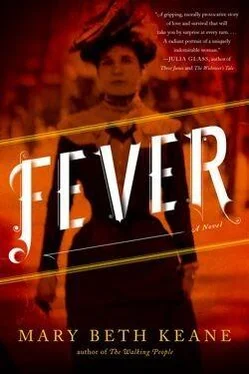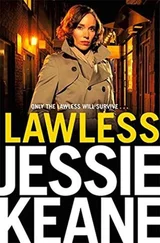The sun went down early, before four o’clock, but the moon was so big and the stars so bright that Alfred realized nighttime meant something else that far north. There was no wind, nothing to stir the trees, and everything was so still and silent inside the warm cocoon of his woolen knits and oilcloth that he forgot the temperature. Minnesota was something to experience, and Alfred thought of Mary, how she’d have liked to see the sky so clear. The tent was as warm as any house, and Alfred wondered at his old self, always searching the corners of his pockets for a coin to put in the gas meter, how every person in New York was a slave to what he earned. Out in the cold wilderness, he’d have no need of money until the spring. He wanted to tell Mary about it. He wanted her to see.
Then one morning after Luc headed off to the crossroads on an errand to trade timber for a stump extractor, and as the brothers were halfway through a trunk as thick as a man laid on his side, they could see that the tree was leaning in the wrong direction and beginning to tip. They shouted to each other in their own language and quickly, foolishly, Gustaf, the older brother, threw his hands up and put his shoulder to the bark as it began to fall. From across the cleared space, a distance of seventy-five yards or so, Alfred watched in dumb silence. He saw Gustaf make a sudden move, and then the tree was down, and Eric was shouting. Alfred stared for a second longer and then realized Eric was shouting at him.
Gustaf was unconscious when they carried him into their shelter, and when they opened his shirt they could see right away that his shoulder was dislocated. “He’s alive, thank God,” Eric said, and Alfred nodded. It was true, but what did that matter now, when they were in the middle of nowhere with an injured man. Luc was not due back for several days and neither Alfred nor Eric had any idea what to do.
“Should we try to get it back into place?” Eric asked.
“I don’t know,” Alfred said.
Eric took hold of his older brother’s arm, and after dipping his head for a moment and drawing his breath, he placed a knee on his older brother’s chest to keep him still, and tried to shove the arm back into the socket. He tried again, roaring as he did so. Now Gustaf was awake and also roaring. Eric tried again. Again. He tore off his brother’s shirt to get a better grip. He gave his brother a spoon to clamp between his teeth. As Alfred held Gustaf’s legs, it occurred to him that they’d want his medicine. He’d told them it was for pain, and Gustaf’s pain was clearly worse than his own. He’d have to give it. If he didn’t give it they’d take it from him. They were peaceful men but they were brothers and they’d sooner kill him than have one of themselves harmed. He calculated how much was left from the clinic that overlooked Lake Harriet. He’d been disciplined about his dosage, treating himself to extra only a handful of times, and then only when the air was so cold and the skin over his wounds grew so tight that he was afraid it would crack open again.
He offered before they could ask, and they took it gratefully. Days went by. A week. Luc had not yet returned, and Eric wondered out loud if he should go to the crossroads himself, or send Alfred. Alfred understood the dilemma: with just three of them at camp, and Gustaf too injured to move, the one left behind would have to put caring for Gustaf above all things, and only Eric would do that. On the other hand, electing Alfred to go to the crossroads meant trusting a virtual stranger to do what he’d been asked to do, to find help, send it back to the woods to the brothers. The brothers didn’t trust him, Alfred saw now. Eric took and took Alfred’s medicine for his brother, and when Alfred suggested that he’d given enough, that he had to save some for himself, Eric looked at him so coldly that Alfred knew his first instinct had been correct. Better to keep giving than be killed. His dreams grew terrifying and he found he couldn’t sleep at all. His body hurt. He became nauseated. There were no odors in the North Country except pine and cold. The inside of his nose felt raw and he imagined a frozen path from his nostrils to his lungs.
He woke up one night to Eric shaking him awake. “What’s wrong with you?” he asked and Alfred realized he’d been shouting, thrashing. There was no sympathy in the question, only accusation. It wasn’t Alfred’s fault that Gustaf had miscalculated the tree. The Swedes talked all day long and sang songs, and where before their red faces had seemed so merry now they seemed to Alfred to be part of their selfishness. They were monsters, the two of them. Who but a monster would choose to live so far from civilization, would dig a hole in the snow and call it a place to live? There were strange animals in the North Country, tracks he didn’t recognize, and he knew they were all gathered somewhere deep in the shadows of the pines, waiting to see what he would do.
He would always be the odd man out, even if he handed over every single drop, every pill. Gustaf didn’t seem to be getting worse, but he wasn’t getting better, either, and now when Eric gave him more of Alfred’s medicine, Alfred felt his blood rise. He doesn’t need it, he said, and Eric looked at Alfred like he’d stepped out naked from behind a curtain. Alfred took bigger and bigger doses at night, and again in the morning so that he could get his share before the Swedes took everything. No more trees were cut. Where before the days had been full of the sounds of work — cutting, cracking, splintering, chopping — now the days were as still and silent as night except for the occasional sound of the skillet on the fire, the pop and crackle of bacon meeting the hot pan, Eric’s boots crunching the top layer of snow outside their tent flap, and finally, ten days after the accident, the sound of cracking on the river, like a volley of gunshots every few minutes, a racket unlike any Alfred had heard in his life.
“You have to go to the crossroads,” Eric told him one morning, two weeks after the accident. “Luc should have been back days ago. Send him back and bring help as well.” He put his hand on his brother’s head. “I think there’s something broken inside. Not just the shoulder. A few bones maybe. I don’t know.”
“I’m not sure I remember the way. Did we pass one other clearing or two? Can I take the compass?”
Eric looked at him with disgust. “You are not an axman,” he said bitterly as he shoved the compass to Alfred’s chest. “Leave that medicine for my brother’s pain.” He put his hand on the barrel of one of the shotguns that was lying on its side by Gustaf’s head. They kept it loaded in case of passing deer.
Alfred fished out one bottle of pills and gave it over easily, knowing he’d be back in the city soon.
“And the rest,” Eric said, using the shotgun to tap Alfred’s other pocket. Alfred closed his fingers around his last vial of morphine and the second bottle of bills. “I need it to get back. I can’t walk all that way and pull my things without it. I need it for rest. I don’t—”
Before Alfred could catch his breath he was on his back, and the Swede’s knee on his neck. He reached down with his good arm, found the bottle and vial, and pushed both into Eric’s face.
When he got to the crossroads he found Luc sitting between two men in the only public house for fifteen miles. All three glanced at Alfred as if they’d been expecting him. Alfred told Luc about the accident, told him about Gustaf’s injuries, but Luc nodded off while he was speaking. So Alfred returned to the crossroads to look for something to carry him back to the city.
• • •
It was April, and spring had already arrived in Minneapolis. The stink of his body was strong now that he was back where women wore tailored spring coats and the men were neatly shaved. The smoking lounge was shut down. At the boardinghouse he asked about work so he could pay his way back to Chicago and then to New York, but no one knew of anything. He went to the clinic on Lake Harriet and bought more medicine with the last of his money. It was a mistake, this place, all its foreign cleanliness. The shops closed early. The food was bland. All anyone talked about was his next meal, the weather, going hunting on the weekend. He had to get home as soon as possible. Thank God he hadn’t talked Mary into coming to this place.
Читать дальше












